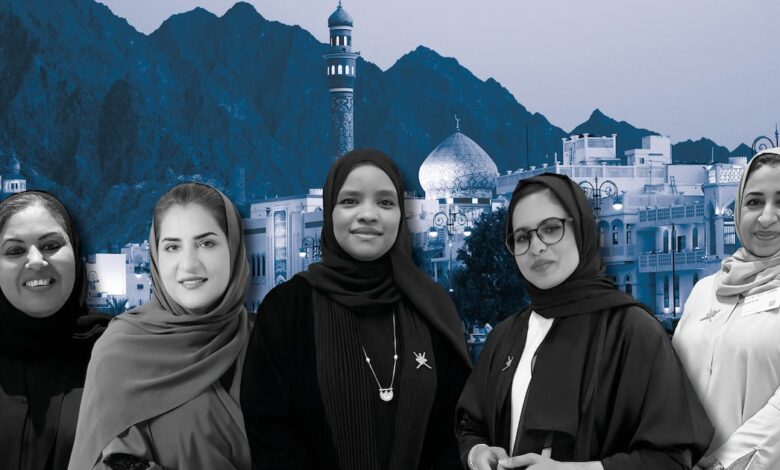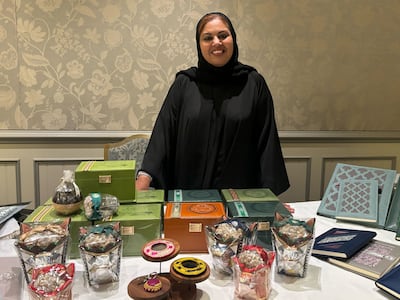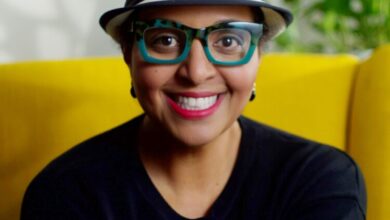The female entrepreneurs taking Oman to the world

Laila Said Al Harthi is an AI expert. Amal Abdallah Raisi is a fashion retailer. Zuwaina Sultan Al Rashdi runs a crafts company.
The three women are part of a growing band of female entrepreneurs helping expand the footprint of Omani businesses beyond the GCC.
New initiatives launched by the Sultanate as part of its Vision 2040, and a changing culture towards working women, have created a platform for them to thrive, an event in London heard.
A commitment to women’s empowerment is not only a matter of social justice but also an investment in the nation’s “human capital”, according to Arwa Al Bulushi, commercial and investment attaché at the Embassy of the Sultanate of Oman in London.
Women registered 70 per cent of small to medium-sized companies in Oman in the last ten years, according to Muscat technology company Arishi. There were more women engineers than men in Oman, said Jen Gramolt of Q5, a UK-based consulting company with offices in the Sultanate.
The ratio of female entrepreneurs rose from 29 per cent in 2021 to 32 per cent in 2022, while the percentage of female business owners reached 6.1 per cent in 2022, according to the Oman Observer.
Ms Al Harthi told The National of the challenges she overcame as a computer scientist in her early twenties when she built her AI-powered recruitment platform Dawam in 2019.
Finding investment had been the first hurdle, as she programmed and presented the software herself in its early stages. There were also cultural challenges, as she was expected to be home at a certain time and not to travel alone.
She said the market has become more likely to invest in a female-run business.
“Because the number of woman entrepreneurs started increasing, this helped a lot in improving the local culture in terms of time constraints, and travelling alone,” she said.
Attending an Omani-British business forum in London this week, Ms Dawan told how she bridged her deep knowledge of Omani culture and technology to ensure her programme was inclusive of the country’s vast regional differences and traditions.
“Oman is rich in culture. In different parts of Oman, you will see different accents, different cultures, different behaviour,” she said. Drawing on these nuances, the platform supported the Ministry of Tourism in recruiting regional people.
A piece of Oman
Designer Ms Raisi founded her fashion company in 2006 hoping to bring a “piece of Oman” to clothing. “We started as a small brand, I had no background in the fashion industry. I only had the will to make it work,” she told The National.
With no workshop of her own, she regularly outsourced work and made frequent trips to India to work with tailors there.
Two years later, she opened her own boutique and atelier in Muscat. The collections which began as abayas and kaftans, now include ready-to-wear, bridal collections and children’s clothes. They are available across the Gulf, including at Harvey Nichols in Dubai.
Oman had been a healthy environment for Ms Raisi to grow her business, she said, with public funds available for small and medium businesses, and “empowering” support from the government.
“Each collection takes inspiration from the culture and history of Oman. People have really connected with that. We’re not any fashion brand. We exist to take the stories of Oman to the world,” she said.
She now mentors aspiring Omani fashion designers, through apprenticeships at her atelier.
As she seeks new markets outside of the GCC, her aim is to bring her collections to the fashion capitals of Europe. “London is one of the main fashion cities around the world. One of my ultimate goals is to be in the London market. Harrods is my goal,” she said.
Ms Al Raisi believes her pieces and silhouettes “will resonate with women from any part of the world”.
“At Harvey Nichols (in the Gulf), I have been the best-selling regional designer for six seasons in a row,” she said. “I’m at a stage where I’m ready to move across the regional borders, and hopefully move internationally. It’s definitely not easy, because there’s a lot of responsibility related to that,” she said.
Keeping tradition alive
Ms Al Rashdi said the need for better branding and representation of Omani products compelled her to launch her own business selling traditional Omani crafts in 2013.
“I wanted to do something that can add value to my society. We have amazing products and talent but have a weakness in presentation,” she said.
Today, her company World of Handicrafts includes a factory and eight branches, including one in Doha, Qatar.
She works closely with women artisans mainly from southern Oman, whose traditions have been dying out. These women were often from more conservative rural areas. “They don’t want to appear [as businesswomen], but they want to work to get economic support. They can work from home and take care of their kids,” she said.

Ms Al Rashdi is in the process of securing a new branch in Saudi Arabia and has hopes that she will also be able to sell her work in London. Any opportunity to help companies like hers grow in the UK was welcome, she said.
“We will try to benefit with anything that makes us grow. We are trying to co-ordinate here with the chamber and our embassy, especially the commercial attaché to see what kind of opportunities we can get,” she said.
Businesswoman and philanthropist Areej Haider Darwish, who heads the women’s committee at the Omani Chamber of Commerce said women in Oman were working in all fields, with many in top positions.
“They are there in all the places. You can see them in all [kinds of] jobs. If they want something they do it well because they have a passion for achieving it,” she told The National. “I am very happy and proud of them.”
Updated: May 31, 2024, 6:00 PM



